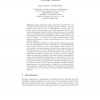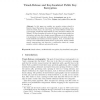174 search results - page 15 / 35 » Secure Identity Based Encryption Without Random Oracles |
162
Voted
EUROCRYPT
2003
Springer
15 years 7 months ago
2003
Springer
Abstract. Digital Signatures emerge naturally from Public-Key Encryption based on trapdoor permutations, and the “duality” of the two primitives was noted as early as Diffie-He...
119
click to vote
ASIACRYPT
2006
Springer
15 years 6 months ago
2006
Springer
Non-interactive zero-knowledge proofs play an essential role in many cryptographic protocols. We suggest several NIZK proof systems based on prime order groups with a bilinear map...
126
Voted
FC
2006
Springer
15 years 6 months ago
2006
Springer
In this paper we consider two security notions related to Identity Based Encryption: Key-insulated public key encryption, introduced by Dodis, Katz, Xu and Yung; and Timed-Release ...
121
Voted
CISC
2008
Springer
15 years 4 months ago
2008
Springer
Anonymity is one of the main concerns in group-oriented cryptography. However, most efforts, for instance, group signatures and ring signatures, are only made to provide anonymity ...
122
click to vote
EUROCRYPT
2007
Springer
15 years 8 months ago
2007
Springer
Among the three broad classes of Identity-Based Encryption schemes built from pairings, the exponent inversion paradigm tends to be the most efficient, but also the least extensibl...


